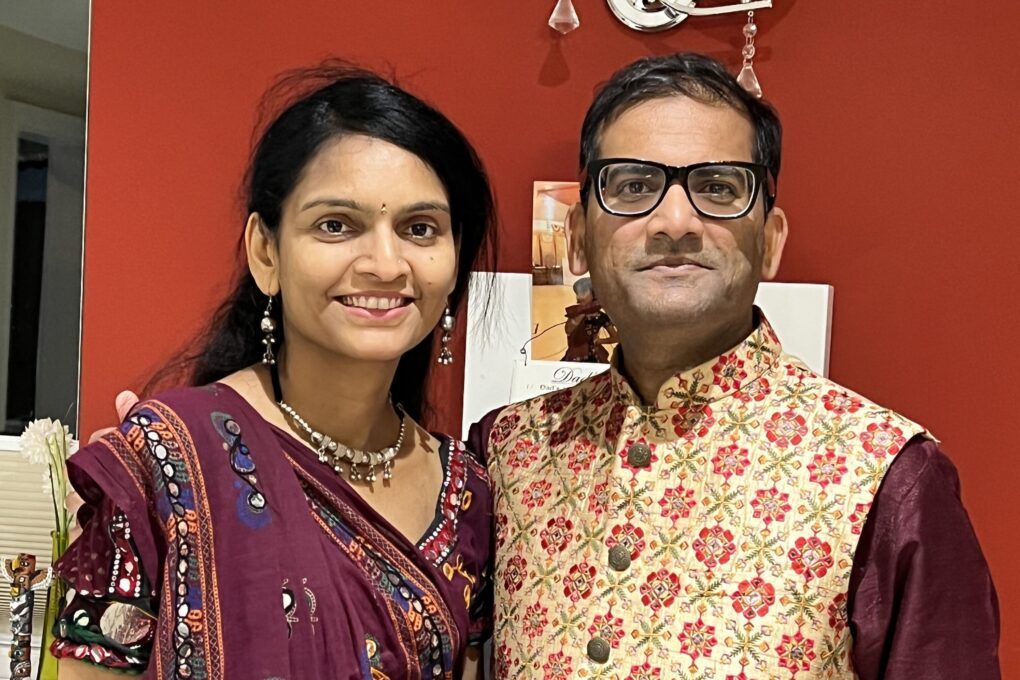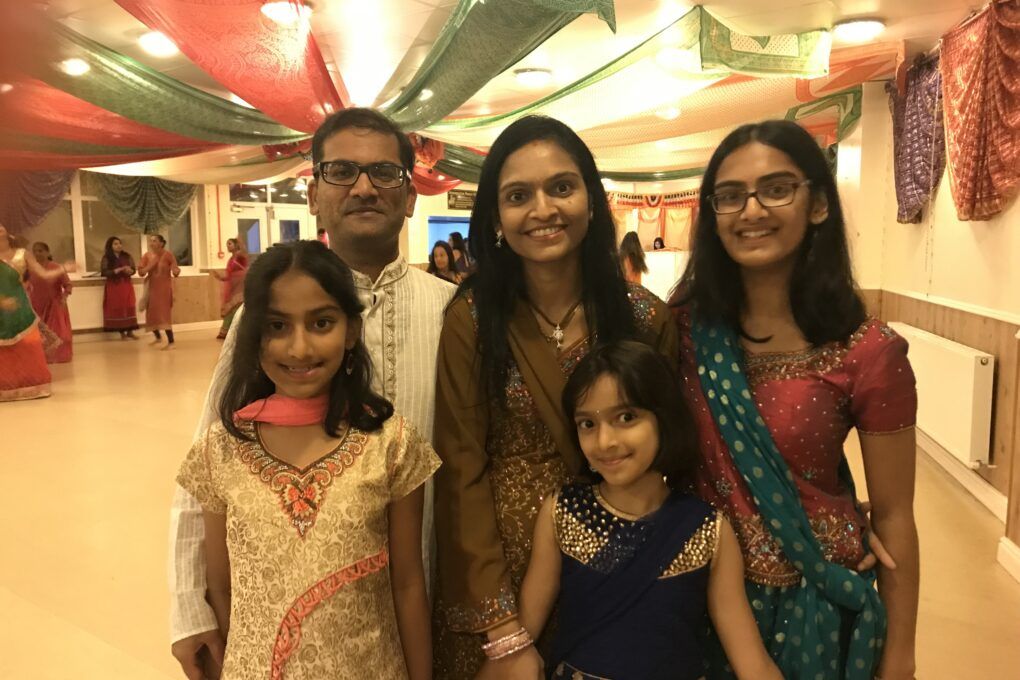‘As a kidney doctor from an ethnic minority, I knew I couldn’t ignore my invite to join Our Future Health’

Most people looking into Our Future Health will see the potential of our programme to help in the fight against diseases. There are a select few, however, who see that their personal and professional lives could be totally transformed by the research. Dr Sunil Daga, a 45-year-old consultant nephrologist from Leeds, is one of them.
As a medical doctor who is focused on improving the early diagnosis of kidney disease, you can hear the enthusiasm for our programme in his voice. “I’m really excited,” he begins. “That’s one of the reasons why I’m participating myself and why I’m promoting it in my community of South Asian colleagues and friends. I’m going to try and encourage as many people as I can to take part.”
When Sunil received a letter from the NHS inviting him to join Our Future Health, it sparked a conversation between him and his wife, Veena – with whom he has three daughters, aged 9, 11 and 16 – about just how life changing the research could be.
“We think it’s amazing,” he says. “Five million people taking part? It will be extraordinary; we couldn’t ignore it.” So, in mid-November, both Sunil and Veena, who is a consultant anaesthetist, joined at their local hub in Leeds.

A silent disease
Sunil’s area of medicine, kidney disease, provides a powerful example of the impact Our Future Health’s research could have.
Our kidneys filter harmful waste from our blood, control the production of red blood cells, and release hormones to regulate blood pressure. When our kidneys go wrong, the consequences can be severe. Kidney failure – also known as Stage 5 Chronic Kidney Disease (CKD), where kidney function is less than 15% – can be fatal, unless you’re able to get treatment that replaces the work of the organ. Right now, over 68,000 people in the UK are being treated for kidney failure.
The problem for doctors is that kidney disease has few visible symptoms during its early stages. While doctors can stop it from advancing during these stages, often patients are only detected by the healthcare system once their disease has developed dangerously. “Kidney disease itself is a silent disease,” says Sunil. “Often, you don’t get any symptoms until it’s too late.” Those symptoms include seeing blood in urine, swollen ankles, and weight loss – all signs that kidney disease is in its later stages.
Screening for the disease can certainly help. Blood and urine tests that look at how well your kidneys are filtering waste can detect kidney disease at an early stage. However, at present, people only have these tests as part of an opt-in, routine check like the NHS Health Check for over 40s, or when they’re having an investigation for another health reason.
“It’s frustrating,” says Sunil. “A lot of the time, people have kidney problems, and they don’t know they have kidney problems. Unless you have a screening or a regular check-up, you won’t detect the early stages.”
“I would love to see Our Future Health collect data which will mean we can detect people with kidney disease earlier on. The earlier you detect, there are so many treatments you can offer.” He explains that when treatments for kidney disease like dialysis [a procedure to remove waste products and excess fluid from the blood when the kidneys stop working properly] or transplants are implemented earlier, they are easier and less invasive. “It’s better than providing treatment at a late stage when there are so many complexities.”
Talking the talk and walking the walk
As well as the benefits Our Future Health could have on his area of medicine, Sunil sees how the programme’s effectiveness is reliant on people, like him, coming forward to take part. “We’re already benefitting from the studies that have been done in the last few decades and now we’re talking about our own future and our kids’ future,” he says.
Sunil is passionate about ensuring there is accurate representation of the UK population in Our Future Health’s database. He hopes to encourage as many people as possible in his community to get involved. “I come from an ethnic minority and I’m very aware that many ethnic minorities are underrepresented in health research studies,” he explains. “I’m trying my best to help that statistic and to participate. I feel morally responsible that, coming from an ethnic minority, I have to play my part to address the underrepresentation of these groups in health research.”
“I also messaged my WhatsApp groups to say ‘Have you heard about this study? You should go for it.’ There are the little things I can do to help the equality and the contribution to science.”
Sunil says that by taking part, individuals are likely to see treatments developed that work better for them because treatments work differently based on your genetics. “I really can’t emphasise enough that if the studies are not inclusive then the treatments that we get out of the research might not necessarily treat the broader group. It will treat the people they were tested on the most.”
As a doctor seeing patients, he wants to feel more confident that the treatment he is offering them is backed by more concrete evidence. “When I see patients in the clinic for kidney disease, quite a number of people I treat are from ethnic minorities,” he says. Kidney Research UK reports that kidney failure is up to five times more common in people from minority ethnic groups. “Yet when I look at the studies, they don’t reflect the patient I am looking after.”
Plugging the representation gap
The problem extends beyond kidney disease. Sunil says representation gaps exist everywhere you look in medicine. He cites heart disease as another example. “A lot of heart disease drugs are developed from studies where men are the predominant participant,” he explains. “What studies are showing now is that the same drugs, when given to women after a heart attack, aren’t as effective. Well, it’s not a surprise because only 25% of those participants are women, 75% are men. Inclusivity across gender, ethnicity and age is really important.”
It’s why Sunil is so excited about the potential of Our Future Health. By building a group of volunteers that truly reflects the UK’s diverse population – across gender, ethnicity, and socio-economic background – we are creating a dataset that can be used to find new tests and treatments for all kinds of people.
In the future, a kidney doctor like Sunil won’t need to worry about the treatments he prescribes being tailored only for a small portion of the population. “There is huge potential here,” he says. “I’m incredibly excited to be involved.”
Volunteer Voices
Volunteer Voices is a regular series that showcases our participants and their reasons for joining Our Future Health. You can find the full series here, or click on one of the below links for an individual story…
Joanne Foden: ‘I wouldn’t be here without the NHS – I wanted to give something back’
Paul Hooley: ‘Joining Our Future Health is like leaving your body to medical science – while you’re still alive’
Renuka Baldwin: ‘I want to help people like me in the future’
Would you like to be featured in Volunteer Voices? Get in contact with us by emailing stories@ourfuturehealth.org.uk. Everyone has something unique to give.

Let’s prevent disease together
By volunteering for Our Future Health, you can help health researchers discover new ways to prevent, detect and treat common conditions such as diabetes, cancer, heart disease, stroke and Alzheimer’s.